Discover Optimising Human Performance
Optimising Human Performance

Optimising Human Performance
Author: OpHP Ltd
Subscribed: 21Played: 406Subscribe
Share
© OpHP Ltd
Description
Unleashing the peak potential of humans who work in the most challenging and pressuring environments.
Martin Jones and Jonpaul Nevin, human performance specialists speak to world experts across the full spectrum of human performance topics, ranging from mindfulness and perfectionism, sleep, nutrition and optimal physical preparation.
Hosted on Acast. See acast.com/privacy for more information.
29 Episodes
Reverse
In this episode, Martin & JP talk to Dr Meaghan Beckner about her work in biomarker research. They explore the concept of resilience and the use of biomarkers to measure physiological and psychological readiness. They discuss the potential of wearable technology, the importance of omics, and the validity of using pre-workout supplements. Guest, Cast & CrewDr Meaghan Beckner is a Postdoctoral Research Fellow at the United States Army Research Institute of Environmental Medicine, where she is involved in innovative studies aimed at optimizing the performance and well-being of military personnel. She specializes in the intersection of military health, nutrition, and cognitive resilience. Hosted by Martin Jones & Jonpaul Nevin https://www.ophp.co.uk Produced & edited by Bess ManleyResourceshttps://www.researchgate.net/profile/Meaghan-Becknerhttps://www.linkedin.com/in/meaghan-e-beckner-phd-624b80353/ Thanks for tuning in. If you found this podcast valuable, please take a moment to rate, share and review. If you have feedback, guest suggestions or topics that you'd love us to cover, then do email us at info@ophp.co.uk or connect with us on LinkedIn. Chapters01:41 Defining Resilience02:26 Understanding Biomarkers05:24 Molecular Biomarkers and Readiness08:09 Cortisol and the Stress Response20:08 Physiological Impact of Special Forces Training37:13 Future Directions in Biomarker Research38:59 Pre-Workout Supplements and Performance41:08 Conclusion and Key TakeawaysThanks for reading this week's show notesFor more information about the podcast please visit our website: www.ophp.co.uk Follow us on LinkedIn: https://www.linkedin.com/company/ophp/and on Instagram: @ophumanperformanceFinally, please subscribe, share, and leave a review!Thanks! Hosted on Acast. See acast.com/privacy for more information.
In this episode, Martin & JP talk to Nathalie Pattyn about human performance in operational environments. They discuss the importance of rest and recovery in training, the role of robustness and the challenges of leadership in high-performance settings. Nathalie has extensive experience working in Antarctica, and the conversation explores the adaptability required to excel in that environment.Guest, Cast & CrewNathalie Pattyn is an emergency doctor, psychologist and academic with 30 years of experience in the Belgian defence force. She heads up VIPER – a research unit that investigates human performance in selected populations, from astronauts to special forces candidates. Hosted by Martin Jones & Jonpaul Nevin https://www.ophp.co.uk Produced & edited by Bess ManleyResourcesNathalie’s open-access book ‘Handbook of Mental Performance’ https://tinyurl.com/yxwa7n23 VIPER’s publications http://viper.rma.ac.be/pub/index.html ‘An Astronaut’s Guide to Life’ by Chris Hadfield https://tinyurl.com/57b8yw6t Thanks for tuning in. If you found this podcast valuable, please take a moment to rate, share and review. If you have feedback, guest suggestions, or topics you'd love us to cover, please email us at info@ophp.co.uk or connect with us on LinkedIn. Chapters01:09 Founding the Viper Research Unit01:57 Research Focus and Applications02:54 Training for Extreme Roles04:23 The Importance of Rest and Recovery05:37 Selection and Robustness14:44 Challenges in Selection Processes24:22 Antarctic Missions and Remote Medicine31:46 Cognitive and Physiological Research38:50 Emerging Technologies and Practical Advice42:18 Leadership and Duty of Care46:57 Conclusion and Final ThoughtsThanks for reading this week's show notesFor more information about the podcast please visit our website: www.ophp.co.uk Follow us on LinkedIn: https://www.linkedin.com/company/ophp/and on Instagram: @ophumanperformanceFinally, please subscribe, share, and leave a review!Thanks! Hosted on Acast. See acast.com/privacy for more information.
In this captivating episode of OHP, hosts Martin Jones and Jonpaul Nevin sit down with the eminent physiologist Professor Andy Jones, a leading figure in endurance sports science. Discover the cutting-edge research that propelled the world's first sub-2-hour marathon, a feat where Professor Jones played a pivotal role in Nike's Breaking2 project.Professor Jones, renowned for his expertise in aerobic capacity, lactate thresholds, and exercise economy, shares invaluable insights into the science behind optimising endurance performance. This discussion extends beyond traditional metrics, such as VO2 max, to explore the crucial concepts of critical speed and the exciting new field of physiological resilience.Whether you're an elite athlete, a dedicated runner, or simply curious about pushing human limits, this episode offers practical advice on how to enhance your endurance and build resilience. Learn about specific training practices of elite athletes, understand how to balance training intensity, and get practical tips for improving your own endurance.Key Topics Covered:Endurance Performance: Conceptualizing and optimizing your athletic potential.VO2 Max: Understanding its importance in endurance.Lactate Thresholds & Critical Speed: Advanced metrics for performance.Physiological Resilience: The "fourth dimension" of endurance and its impact on fatigue.Sub-2-Hour Marathon: The groundbreaking science and training behind this historic achievement.Training for Endurance: Practical tips, intensity distribution, and elite athlete practices.Exercise Economy: Improving efficiency for sustained performance.About Professor Andy Jones:Professor Andy Jones is a highly respected academic and researcher at the University of Exeter, specialising in exercise physiology and endurance sports. His distinguished career encompasses extensive research into factors affecting aerobic performance, as well as significant contributions to world-record-breaking athletic achievements.Resources Mentioned:Professor Andy Jones' University of Exeter Profile: https://experts.exeter.ac.uk/1327-andy-jonesAndy Jones on X (formerly Twitter): https://x.com/andybeetroot?lang=enKeywords:Endurance PerformanceProfessor Andy JonesPhysiological ResilienceCritical SpeedSub-2-Hour MarathonVO2 MaxLactate ThresholdExercise EconomyRunning ScienceMarathon TrainingAthletic PerformanceSports ScienceNike Breaking2Endurance TrainingFatigue ManagementElite AthletesAerobic CapacityDid you find this episode valuable? Please take a moment to rate, share, and review the podcast. Your feedback helps us reach more listeners! If you have questions, guest suggestions, or topics you'd like us to cover, email us at info@ophp.co.uk or connect with us on LinkedIn.Thanks for reading this week's show notesFor more information about the podcast please visit our website: www.ophp.co.uk Follow us on LinkedIn: https://www.linkedin.com/company/ophp/and on Instagram: @ophumanperformanceFinally, please subscribe, share, and leave a review!Thanks! Hosted on Acast. See acast.com/privacy for more information.
This episode is a deep dive into the field of periodisation with world-leading expert Professor Gregory Haff. We explore what periodisation is, why it’s important and how it can be used to enhance performance and reduce the risk of injury.Guest, Cast & CrewGregory Haff is a highly respected strength scientist, researcher, strength and conditioning coach, weightlifting coach and author. His extensive research focuses on improving resistance training methodologies for athletes to enhance performance and prevent injuries. Professor Haff has collaborated with numerous National and Olympic teams across various sports, including weightlifting, rowing, and track cycling. More recently, his work has expanded to developing effective **training strategies for defence personnel**, preparing them for demanding physical challenges.Hosted by Martin Jones & Jonpaul Nevin https://www.ophp.co.uk Produced & edited by Bess ManleyResourcesGreg’s email: g.haff@ecu.edu.au Greg’s recent book on Periodisation https://www.human-kinetics.co.uk/9781492561675/scientific-foundations-and-practical-applications-of-periodization/ Greg on Linkedin https://www.linkedin.com/in/g-gregory-haff-69078a10/?originalSubdomain=au Greg on Instagram https://www.instagram.com/doc_haff/?hl=en-gb Reearch paper on Australian SF selection course recovery https://www.sciencedirect.com/org/science/article/pii/S1715531224001315#sec7 Thanks for tuning in. If you found this podcast valuable, please take a moment to rate, share and review. If you have feedback, guest suggestions or topics that you'd love us to cover, then do email us at info@ophp.co.uk or connect with us on LinkedIn. Chapters00:11 Greg's Journey into Sports Science01:41 Understanding Periodisation03:27 Holistic Approach to Training06:01 Psychological Aspects of Training09:01 Historical Evolution of Periodisation15:44 Fundamental Principles of Periodisation22:34 Applying Periodisation in Tactical Environments25:34 Key Components of Tactical Training26:38 Integrating CrossFit and Tactical Training27:26 Challenges and Benefits of CrossFit28:56 Effective Training Strategies35:45 Physiological Impact of Selection Courses38:03 Research Findings and Recommendations46:35 Concluding ThoughtsThanks for reading this week's show notesFor more information about the podcast please visit our website: www.ophp.co.uk Follow us on LinkedIn: https://www.linkedin.com/company/ophp/and on Instagram: @ophumanperformanceFinally, please subscribe, share, and leave a review!Thanks! Hosted on Acast. See acast.com/privacy for more information.
World-renowned sleep expert Dr. Michael Gradisar explains the truth behind some of the most commonly misunderstood topics regarding sleep, including the impact of blue light, technology and magnesium. He also discusses the unique sleep challenges faced by high-stress professionals, and offers practical advice for helping children and adolescents to sleep better. Guest, Cast & CrewDr. Michael Gradisar is a sleep researcher and clinical psychologist specialising in sleep disorders, specifically insomnia & circadian rhythm disorders. After many years working in academia, he is currently Head of Sleep Science at sleepcycle.com, an app that helps users to track and improve their sleep.Hosted by Martin Jones & Jonpaul Nevin https://www.ophp.co.uk Produced & edited by Bess ManleyResourcesSleep Cycle https://sleepcycle.com/ ‘Helping Your Child With Sleep Problems’ by Michael Gradisar & Rachel Hiller https://www.amazon.co.uk/Helping-Your-Child-Sleep-Problems/dp/1472138724 Michael’s published work on Google Scholar https://scholar.google.com.au/citations?hl=en&user=Q7Yn6bgAAAAJ&view_op=list_works&sortby=pubdate Review of blue light research https://www.sciencedirect.com/science/article/pii/S1087079224000376 Review of Magnesium effectiveness https://pmc.ncbi.nlm.nih.gov/articles/PMC8053283/ Nodding Off by Alice Gregory https://www.amazon.co.uk/Nodding-Off-Science-Sleep-Cradle/dp/1472946189 Sleepio https://www.sleepio.com/sleepio/nhs/391#1/1 Thanks for tuning in. If you found this podcast valuable, please take a moment to rate, share and review. If you have feedback, guest suggestions or topics that you'd love us to cover, then do email us at info@ophp.co.uk or connect with us on LinkedIn. Chapters00:15 Introducing Michael: Sleep Researcher and Clinical Psychologist01:39 Understanding the Importance of Sleep03:10 Debunking Sleep Myths: Blue Light and Sleep Hygiene11:06 The Truth About Magnesium and Sleep15:17 Technology and Sleep: Coping Mechanisms and Emotional Regulation18:31 Sleep Challenges in Children and Adolescents20:40 Navigating the Sleep Roadmap21:25 Sleep Solutions for Infants and Teenagers22:26 Technology's Impact on Sleep25:03 Challenges in High-Stress Professions28:51 Personalized Sleep Strategies37:14 Follow Science, Not Scientists41:08 Final Thoughts and ResourcesThanks for reading this week's show notesFor more information about the podcast please visit our website: www.ophp.co.uk Follow us on LinkedIn: https://www.linkedin.com/company/ophp/and on Instagram: @ophumanperformanceFinally, please subscribe, share, and leave a review!Thanks! Hosted on Acast. See acast.com/privacy for more information.
Afghanistan veteran Luke Sinnot talks candidly about the experience of losing both his legs in an IED explosion and his journey through rehabilitation. He describes the physical and psychological challenges that he faced, and the pivotal role that sport and humour have played in his recovery. Guest, Cast & CrewLuke Sinnott lost both his legs while serving as a Royal Engineers Search Advisor in Afghanistan in 2010. He has since gone on to represent Great Britain in both para sailing and long jump and is currently training to be a commercial pilot. Hosted by Martin Jones & Jonpaul Nevin https://www.ophp.co.uk Produced & edited by Bess ManleyResourceshttps://www.instagram.com/sinnott.luke/?hl=en-gbhttps://x.com › sinnottluke Thanks for tuning in. If you found this podcast valuable, please take a moment to rate, share and review. If you have feedback, guest suggestions or topics that you'd love us to cover, then do email us at info@ophp.co.uk or connect with us on LinkedIn. Chapters00:10 Luke’s Background and Career Journey03:13 Counter IED Operations in Afghanistan05:55 Challenges and Responsibilities of Command14:30 The Incident and Aftermath21:55 Arrival at DMRC Headley Court22:23 Life in the Rehabilitation Facility25:02 Meeting JP and the Role of PTIs26:30 Understanding Resilience30:20 The Importance of Humor and Sport in Rehab35:24 Operation Surf and Its Impact37:25 Transition to Long Jumping40:27 Final Thoughts and Future AspirationsThanks for reading this week's show notesFor more information about the podcast please visit our website: www.ophp.co.uk Follow us on LinkedIn: https://www.linkedin.com/company/ophp/and on Instagram: @ophumanperformanceFinally, please subscribe, share, and leave a review!Thanks! Hosted on Acast. See acast.com/privacy for more information.
In this insightful episode, join Martin and JP as they delve into the intricate world of brain injury with leading clinical neuropsychologist Professor Huw Williams. Discover the profound impacts of brain trauma on cognition, emotions, and behaviour, and gain a deeper understanding of the complexities involved in neuro-rehabilitation.The discussion also tackles the critical challenges of detecting and treating often-overlooked repetitive sub-concussive head injuries, particularly in high-risk professions such as the military and sports. Learn about the crucial role of screening systems and the exciting potential of AI and big data to revolutionize brain injury treatment and recovery in the future.This episode is essential for anyone interested in neurology, brain health, sports medicine, military health, rehabilitation, cognitive science, and the future of healthcare technology.Guest, Cast & CrewHuw Williams is a Professor of Clinical Neuropsychology and Co-Director of the Centre for Clinical Neuropsychology Research at Exeter University. He has published papers and books and held grants in a range of areas of Clinical Neuropsychology, particularly on neuro-rehabilitation and recently regarding crime.Hosted by Martin Jones & Jonpaul Nevin https://www.ophp.co.uk Produced and edited by Bess ManleyResourcesW.H.Williams@exeter.ac.uk https://experts.exeter.ac.uk/2239-huw-williams https://scholar.google.co.uk/citations?user=mWYMEVoAAAAJ&hl=en Thanks for tuning in. If you found this podcast valuable, please take a moment to rate, share and review. If you have feedback, guest suggestions or topics that you'd love us to cover, then do email us at info@ophp.co.uk or connect with us on LinkedIn. Chapters01:58 What is Clinical Neuropsychology?02:49 Case Study: The Impact of Traumatic Brain Injury07:14 Types of Brain Injuries and Their Consequences14:27 Repetitive Sub-Concussive Head Injuries19:18 Screening and Monitoring for Brain Injuries25:11 Brain Connectivity and Concussions25:36 Advanced Brain Imaging Techniques27:22 Biomarkers and Screening for Brain Injuries28:46 Brain Injuries in Prison Populations29:42 Negative Outcomes of Brain Injuries31:13 Support Systems for Brain Injury Rehabilitation36:19 Policy Implications and Recommendations47:08 Future Technologies in Brain Injury Detection48:59 Final Thoughts and Key Messages"Thanks for tuning in! If you found this discussion on brain injury and human performance valuable, please take a moment to rate, share, and review our podcast. Your feedback helps us reach more listeners. For suggestions, guest ideas, or topics you'd like us to cover, email us at info@ophp.co.uk or connect with us on LinkedIn. Thanks for reading this week's show notesFor more information about the podcast please visit our website: www.ophp.co.uk Follow us on LinkedIn: https://www.linkedin.com/company/ophp/and on Instagram: @ophumanperformanceFinally, please subscribe, share, and leave a review!Thanks! Hosted on Acast. See acast.com/privacy for more information.
World-record-setting adventurer and extreme location safety expert Aldo Kane talks to Martin and Jonpaul about the challenges of working in hostile environments, from active volcanoes to big wall climbs. They explore strategies for dealing with stress, the impacts of isolation on mental health, the importance of character and the role of physical fitness. They also discuss how Aldo prepares for his expeditions and how he decompresses afterwards. Guest, Cast & CrewAldo Kane is a world record-setting adventurer, an extreme environment specialist, and a former Royal Marine Commando sniper. With over a decade of military service that included active operations across the globe, Aldo developed a rare mix of resilience, technical skill and psychological endurance. Since leaving the military, Aldo has become a trusted figure behind and in front of the camera. His work spans more than 45 television and film productions, often shot in some of the planet’s most remote and hostile regions. He has operated in war zones, descended into active volcanoes, escaped Ebola outbreaks, rowed across the Atlantic and even dived on the wreck of Captain Kidd’s pirate ship. He has been held at gunpoint and charged by a black rhino, all in the line of duty for major broadcasters such as National Geographic, BBC, Discovery, Channel 4, Disney+ and more.A Fellow of the Royal Geographical Society, Aldo is also an author, producer, climber, professional diver, skydiver, bodyguard and qualified medic. His first book, Lessons From the Edge, published by Yellow Kite in 2021, shares lessons drawn from a life lived at the limits.Aldo Kane continues to operate at the edge, where few are equipped to follow.Hosted by Martin Jones & Jonpaul Nevin https://www.ophp.co.uk Produced & edited by Bess ManleyResourcesAldo’s book ‘Lessons from the Edge’ https://www.amazon.co.uk/Lessons-Edge-Inspirational-Surviving-Adventure/dp/1529350727 https://www.instagram.com/aldokane/?hl=enhttps://x.com/AldoKane Thanks for tuning in. If you found this podcast valuable, please take a moment to rate, share and review. If you have feedback, guest suggestions or topics that you'd love us to cover, then do email us at info@ophp.co.uk or connect with us on LinkedIn. Chapters00:17 Aldo's Background and Career Journey03:40 Challenges and Team Dynamics in Extreme Environments09:07 Physical and Mental Preparation for Expeditions16:08 Work-Life Balance and Technology's Impact22:39 Isolation Experiment in a Nuclear Bunker31:02 The Impact of Isolation on Wellbeing32:26 Dangerous Encounters with Cartels32:56 Managing Risk in Extreme Environments35:16 Inspiration from Ancient Cave Art37:30 Commonalities Across Different Societies38:32 Techniques for Handling Stressful Situations44:04 The Challenge of Endurance Events49:33 Post-Expedition Recovery Strategies53:56 Upcoming Projects and Final ThoughtsThanks for reading this week's show notesFor more information about the podcast please visit our website: www.ophp.co.uk Follow us on LinkedIn: https://www.linkedin.com/company/ophp/and on Instagram: @ophumanperformanceFinally, please subscribe, share, and leave a review!Thanks! Hosted on Acast. See acast.com/privacy for more information.
In this episode, Martin and JP discuss addiction with addiction specialist nurse, Pam Diamond, a seasoned mental health nurse with a privileged career dedicated to addiction and trauma, particularly within the military environment. Pam shares her unique insights from years working with the Royal Marines and other services, revealing the hidden struggles faced by high-performing individuals.We explore:The invisible battle: Why addiction, especially to alcohol, becomes a sneaky and often encouraged coping mechanism in demanding fields like the military.Beyond alcohol: Pam sheds light on other prevalent but often hidden addictions she's encountered, including gambling, pornography, and even excessive gym use.The changing landscape: How societal shifts, such as the rise of social media and increased health consciousness, are impacting traditional military drinking culture.When health becomes harmful: Identifying the tipping point where a seemingly normal behaviour transforms into a destructive compulsion.Breaking the silence: Practical advice for individuals recognising problematic patterns and for friends and family seeking to support those in denial.The path to recovery: Understanding the challenges of overcoming addiction, the importance of seeking support, and remembering your "why."Join us for a candid conversation that unpacks the complexities of addiction in high-stakes environments, offering hope and guidance for those grappling with these silent battles.Guest, Cast & CrewPam Diamond is a mental health nurse, specialising in addiction. Her 30-year career has been split between the NHS and military settings, including the Royal Marines. Pam continues her work in addiction intervention as part of Pam Diamond Therapy. Hosted by Martin Jones & Jonpaul Nevin https://www.ophp.co.uk Produced & edited by Bess ManleyResourcesEmail pamdiamondtherapy@gmail.comThanks for tuning in. If you found this podcast valuable, please take a moment to rate, share and review. If you have feedback, guest suggestions, or topics you'd love us to cover, please email us at info@ophp.co.uk or connect with us on LinkedIn. Chapters00:21 Pam's Journey into Addiction and Mental Health01:16 Transition to Military Work02:07 Challenges in Military Addiction Work04:33 Alcohol Culture in the Military07:06 Changing Attitudes Towards Alcohol17:42 Exploring Other Addictions20:51 Understanding Compulsive Behaviours22:14 The Role of Identity in Exercise22:34 Strange Exercise Behaviours24:27 The Impact of Social Media and Accessibility26:51 Seeking Help and Support34:21 Challenges in Overcoming Addictions37:39 Final Thoughts and ReflectionKeywords: military addiction, alcohol abuse, high performance, hidden addiction, mental health, trauma, Royal Marines, gambling addiction, pornography addiction, gym addiction, recovery, support, Pam Diamond, Optimising Human PerformanceThanks for reading this week's show notesFor more information about the podcast please visit our website: www.ophp.co.uk Follow us on LinkedIn: https://www.linkedin.com/company/ophp/and on Instagram: @ophumanperformanceFinally, please subscribe, share, and leave a review!Thanks! Hosted on Acast. See acast.com/privacy for more information.
In this episode, Martin and JP talk with Tim Boughton, whose own personal experiences with PTSD led him to become a trailblazer in the world of mental health, with a particular expertise in mindfulness-based cognitive therapy (MBCT) and trauma. They explore the misconceptions around mindfulness, the stigma associated with mental health, and how understanding the mind-body connection challenges existing military practices. Tim also introduces a simple mindfulness practice for listeners and offers insights around integrating these practices into various domains.Guest, Cast & CrewTim Boughton is a leading expert in the field of military mindfulness and trauma. He works with elite military and commercial entities around the world to help them gain that extra margin through cognitive and behavioural science and has recently been awarded an honorary doctorate from the University of Middlesex in recognition of his outstanding achievements. Hosted by Martin Jones & Jonpaul Nevin https://www.ophp.co.uk Produced and edited by Bess ManleyResourcesLinkedin https://www.linkedin.com/in/timboughtonkcn/?originalSubdomain=uk To contact Tim please email the podcast at info@ophp.co.uk Thanks for tuning in. If you found this podcast valuable, please take a moment to rate, share and review. If you have feedback, guest suggestions or topics that you'd love us to cover, then do email us at info@ophp.co.uk or connect with us on LinkedIn. Chapters00:15 Introducing Tim Boughton02:35 Tim's Personal Journey with PTSD and Mental Health04:43 Understanding Mindfulness and Its Misconceptions08:31 Mindfulness Techniques and Their Impact on Trauma13:47 Mindfulness in High-Performance Environments17:17 The Mind-Body Connection and Modern Mindfulness23:00 Practical Applications of Mindfulness27:28 Mindfulness in High-Stress Environments28:07 The Impact of Environment on Mindfulness29:10 The Role of Mindfulness in Daily Life30:03 Personal Experiences with Mindfulness31:32 Addressing Mental Health in the Military32:21 Challenges and Innovations in Mental Health38:01 Integrating Mindfulness into Human Performance42:09 A Guided Mindfulness Practice47:51 Overcoming Misconceptions About Mindfulness52:59 Final Thoughts and AdviceThanks for reading this week's show notesFor more information about the podcast please visit our website: www.ophp.co.uk Follow us on LinkedIn: https://www.linkedin.com/company/ophp/and on Instagram: @ophumanperformanceFinally, please subscribe, share, and leave a review!Thanks! Hosted on Acast. See acast.com/privacy for more information.
Episode 4 : Movement and Skill Acquisition with Dr Chris ConnaboyIn this episode, Martin and JP talk to Dr Chris Connaboy, an expert in movement, coordination and skill acquisition. They discuss motor control, perception-action coupling and Chris’ ground-breaking new research into gait analysis. The episode also includes practical advice on training for load carriage, the importance of individualised strength conditioning, and investigating rate limiters. Guest, Cast & CrewDr Chris Connaboy is an eminent academic based at the Rosalind Franklin University of Medicine and Science in Chicago who has carried out research for NASA amongst other esteemed organisations. As a former infantry soldier in the Black Watch, Chris has a particular research interest in training practices employed by the military, including load carriage.Hosted by Martin Jones & Jonpaul Nevin https://www.ophp.co.uk Edited by Bess ManleyResourcesRosalind Franklin University of Medicine and Science https://www.rosalindfranklin.edu/academics/faculty/christopher-connaboy/ Linkin https://www.linkedin.com/in/connaboy/Thanks for tuning in. If you found this podcast valuable, please take a moment to rate, share and review. If you have feedback, guest suggestions or topics that you'd love us to cover, then do email us at info@ophp.co.uk or connect with us on LinkedIn. Chapters00:14 Introducing Dr. Chris Connaboy01:16 Chris' Military Background and Early Questions04:34 Discovering Biomechanics and Motor Control05:31 Understanding Motor Control and Movement Variability09:45 Applying Dynamic Systems Theory in Training12:28 Real-World Examples and Practical Applications16:30 Exploring Dynamical Systems and Self-Organization20:28 Understanding Rate Limiters in Physical Performance21:31 Dynamic Systems Theory in Military Load Carriage22:12 Research Insights on Load Carriage and Injury Prevention27:18 Strength and Conditioning for Load Carriage31:07 Perception-Action Coupling Explained34:19 Challenges in Perception-Action Coupling39:57 Innovative Research in Human Performance40:25 Final Thoughts and Future DirectionsThanks for reading this week's show notesFor more information about the podcast please visit our website: www.ophp.co.uk Follow us on LinkedIn: https://www.linkedin.com/company/ophp/and on Instagram: @ophumanperformanceFinally, please subscribe, share, and leave a review!Thanks! Hosted on Acast. See acast.com/privacy for more information.
Episode 3Unlocking Expertise: The Science Behind Skill Acquisition and Decision MakingIn this episode, Martin talks to Professor Mark Williams, a leading authority on the acquisition and development of expertise. They discuss skill acquisition, the role of experience and purposeful practice. They also explore the use of simulators, the unique challenges of maintaining skills in high-stress environments and the importance of evidence-based practices in improving performance.Guest, Cast & CrewMark Williams is one of the world’s leading authorities on expertise and its acquisition in sport. He also has experience in military settings, law enforcement, aviation and medicine. He has worked in a range of academic institutions in the UK and US, including Liverpool John Moores University, University of Sydney, University of Utah and Florida Institute for Human & Machine Cognition. Hosted by Martin Jones https://www.ophp.co.uk Edited by Bess ManleyResourcesMark’s email mark.williams@health.utah.eduMark’s bio https://psych.utah.edu/people/adjunct-faculty/mark-williams.php Mark’s popular science book ‘The Best: How Elite Athletes Are Made’ by Mark Williams & Tim Wigmore. https://www.amazon.co.uk/Best-How-Champions-Are-Made/dp/1529304350 Anders Ericsson book ‘Peak’ https://www.worldofbooks.com/en-gb/products/peak-book-anders-ericsson-9780099598473?sku=NGR9780099598473&gad_source=1&gclid=CjwKCAiA6t-6BhA3EiwAltRFGH4MHwz8Nh2GQplRBPtVnN6yaRXD6UzINU6KWmIItYhW4YxiIgxVyxoCM8QQAvD_BwE Thanks for tuning in. If you found this podcast valuable, please take a moment to rate, share and review. If you have feedback, guest suggestions or topics that you'd love us to cover, then do email us at info@ophp.co.uk or connect with us on LinkedIn. Chapters00:54 Mark's Research Interests and Career Journey02:59 Diving into Decision Making in High-Stress Situations06:21 The 10,000 Hours Rule and Expertise12:13 The Role of Simulators and VR in Training16:44 Transferability of Skills Across Domains23:43 Maintaining and Developing Skills28:36 The Neuroscience of Learning and Muscle Development29:32 Skill Atrophy in Different Domains30:46 Deliberate Practice and Skill Maintenance31:41 Repetition vs. Specificity in Training33:02 Stress and Performance in High-Stakes Environments35:12 Talent Identification and Development42:11 Task Generic vs. Task Specific Cognitive Skills44:42 Optimizing Learning Environments with Technology51:15 The Importance of Evidence-Based PracticeThanks for reading this week's show notesFor more information about the podcast please visit our website: www.ophp.co.uk Follow us on LinkedIn: https://www.linkedin.com/company/ophp/and on Instagram: @ophumanperformanceFinally, please subscribe, share, and leave a review!Thanks! Hosted on Acast. See acast.com/privacy for more information.
Episode 2 - Concussion in High Performance EnvironmentsMartin and Jonpaul talk to award-winning author and sports journalist Sam Peters about concussion. They discuss the role of emerging technologies in diagnosing concussion in both sport and military contexts and the potentially devastating impacts of asymptomatic sub-concussive blows.Guest, Cast & CrewSam Peters’ work has transformed sport’s attitude towards head injuries. He was the driving force behind the Mail on Sunday’s concussion in rugby campaign and has recently published a critically-acclaimed book on the topic, called Concussed: Sport’s Uncomfortable Truth.Hosted by Martin Jones & Jonpaul Nevin https://www.ophp.co.uk Edited by Bess ManleyResourcesSam’s email Sam@concussed.mediaSam’s award-winning book https://www.amazon.co.uk/Concussed-Sports-Uncomfortable-Sam-Peters/dp/1838955771Sam’s upcoming events https://www.concussed.media/eventsPlanted Community https://planted-community.co.uk/Thanks for tuning in. If you found this podcast valuable, please take a moment to rate, share and review. If you have feedback, guest suggestions or topics that you'd love us to cover, then do email us at info@ophp.co.uk or connect with us on LinkedIn. Chapters01:19 Meet Sam Peters: Background and Career03:08 The Rise of Professional Rugby and Injury Concerns06:41 Concussion Culture in Rugby13:34 Historical Perspectives on Head Trauma15:15 Military and Sports: Parallels in Head Trauma18:38 Technological Advances in Concussion Diagnosis20:53 Cultural Change and Education in Concussion Management25:02 Understanding CTE: Definition and Symptoms26:07 CTE in Sports: Research and Recognition28:29 Diagnosing CTE: Challenges and Advances30:35 Secondary Impact Syndrome: A Closer Look34:43 Concussion Management in Sports37:18 Cultural and Institutional Challenges40:21 Lessons from Rugby for Other High-Risk Occupations44:20 Future Directions and Final ThoughtsThanks for reading this week's show notesFor more information about the podcast please visit our website: www.ophp.co.uk Follow us on LinkedIn: https://www.linkedin.com/company/ophp/and on Instagram: @ophumanperformanceFinally, please subscribe, share, and leave a review!Thanks! Hosted on Acast. See acast.com/privacy for more information.
EPISODE 1: Innovations in Performance Tech with Dr David PutrinoMartin and Jonpaul talk to neuroscientist Dr David Putrino, whose job it is to find innovative human performance technologies and roadtest them. From brain stimulation to mitochondrial supplements, David takes us through the tech that works and the stuff that doesn’t live up to the hype. He also shares insights from his work with high-performance athletes at Red Bull. Guest, Cast & CrewDr David Putrino is the Director of Rehabilitation Innovation for the Mount Sinai Health System, a network of hospitals in New York City. He is also a consultant for Red Bull High Performance division, using evidence-based technologies to improve athletic performance. Hosted by Martin Jones & Jonpaul Nevin https://www.ophp.co.uk Edited by Bess ManleyResourcesLinkedin: https://www.linkedin.com/in/david-putrino-bb86aa11/ Blue Sky: https://bsky.app/profile/putrinolab.bsky.social Instagram: https://www.instagram.com/putrino_lab/ Icahn School of Medicine at Mount Sinai https://icahn.mssm.edu/research/abilities-research-center/about/directors Thanks for tuning in. If you found this podcast valuable, please take a moment to rate, share and review. If you have feedback, guest suggestions or topics that you'd love us to cover, then do email us at info@ophp.co.uk or connect with us on LinkedIn. Chapters01:46 David's Role and Research at Mount Sinai07:38 The rise of neuroscience10:05 The Hype and Reality of Brain Stimulation16:53 Effective Technologies for Enhancing Performance18:54 Mitochondrial Supplements and Probiotics23:18 David's Journey to Red Bull24:40 Meeting Andy Walsh and Red Bull Projects25:28 Pushing Athletes Beyond Limits26:06 Performance Under Pressure camps at Red Bull27:48 Insights from Project Endurance30:01 Understanding Stress and Flow35:35 Neuroplasticity38:59 Wearable Technology in PerformanceThanks for reading this week's show notesFor more information about the podcast please visit our website: www.ophp.co.uk Follow us on LinkedIn: https://www.linkedin.com/company/ophp/and on Instagram: @ophumanperformanceFinally, please subscribe, share, and leave a review!Thanks! Hosted on Acast. See acast.com/privacy for more information.
Martin Jones and Jonpaul Nevin, hosts of the Optimising Human Performance Podcast share their story, why they have produced this podcast and why it is important to the community of individuals and teams working in high-stress and high stakes environments.Thanks for reading this week's show notesFor more information about the podcast please visit our website: www.ophp.co.uk Follow us on LinkedIn: https://www.linkedin.com/company/ophp/and on Instagram: @ophumanperformanceFinally, please subscribe, share, and leave a review!Thanks! Hosted on Acast. See acast.com/privacy for more information.
EPISODE 12: The Chimp Paradox with Professor Steve PetersIn this episode, Martin and Jonpaul talk to renowned psychiatrist Professor Steve Peters, who specialises in the functioning of the human mind. They discuss his famous ‘Chimp Model’ and its application in high-stress environments. They explore imposter syndrome and the antecedents of high performance.Guest, Cast & CrewProfessor Steve Peters is a medical doctor specialising in mental health and the functioning of the human mind. His work spans education, the national health service, the corporate world, and elite sports. He helps people understand how the mind works, gain insight into their own unique mind and situation, and develop the skills to optimise individual performance and quality of life.Hosted by Martin Jones & Jonpaul Nevin https://www.ophp.co.uk Edited by Bess ManleyProduced by Wavell Room https://wavellroom.com/ ResourcesSteve’s company: https://chimpmanagement.com Steve’s official website https://profstevepeters.com Steve’s Books, including The Chimp Paradox https://chimpmanagement.com/books-by-professor-steve-peters/If you’re enjoying this content, please like and subscribe so we can keep improving. Remember to visit Wavell Room for their latest articles, podcasts, and newsletters. Chapters01:47 Steve Peters' Background and Career Journey05:03 The Chimp Model Explained09:29 Imposter Syndrome and Its Implications17:46 The Neuroscience Behind the Chimp Model23:28 Values and Team Cohesion in High-Performance Environments30:32 The Reality of Elite Sports Life31:45 Psychopaths in Boxing: A Unique Perspective33:16 Adapting and Learning in High-Stress Jobs34:42 The Importance of Individualized Training38:56 Preparing for the Unexpected40:36 Dealing with Trauma in Psychiatry46:37 Addressing Moral Injury in Extreme Jobs51:40 Looking to the Future: Legacy and Personal Projects55:59 Steve Sets An Emotional Health ChallengeUp NextThis is the final episode of this first series, but all 12 episodes will remain available for you to listen to. We hope to be bringing you a second series very soon. Thanks for listening.Thanks for reading this week's show notesFor more information about the podcast please visit our website: www.ophp.co.uk Follow us on LinkedIn: https://www.linkedin.com/company/ophp/and on Instagram: @ophumanperformanceFinally, please subscribe, share, and leave a review!Thanks! Hosted on Acast. See acast.com/privacy for more information.
EPISODE 11: Sleep, Circadian Neuroscience & Human PerformanceIn this episode, Martin and Jonpaul talk to Professor Russell Foster, a world-renowned expert on sleep and circadian rhythms. They discuss the importance of sleep and circadian rhythms for human performance, how the circadian system provides the time structure for life, optimising physiology and behavior, and highlight some evidence-based strategies for enhancing sleep quality and quantity. Guest, Cast & CrewRussell Foster is Professor of Circadian Neuroscience, director of the Sir Jules Thorn Sleep and Circadian Neuroscience Institute and the head of The Nuffield Laboratory of Ophthalmology at the University of Oxford. Russell’s research interests span visual and circadian neurobiology, focusing on the mechanisms by which light regulates circadian rhythms. Russell has published hundreds of peer-reviewed articles and books, including his recent book, ‘Life Time: the New Science of the Body Clock and How It Can Revolutionize Your Sleep and Health’. Hosted by Martin Jones & Jonpaul Nevin https://www.ophp.co.uk Edited by Bess ManleyProduced by Wavell Room https://wavellroom.com/ ResourcesSir Jules Thorn Sleep & Circadian Neuroscience Institute https://www.scni.ox.ac.ukNuffield Department of Clinical Neurosciences, University of Oxford https://www.ndcn.ox.ac.uk/team/russell-foster ‘Life Time: the New Science of the Body Clock and How It Can Revolutionize Your Sleep and Health’ by Russell Foster https://www.pemberleybooks.com/product/the-ecology-of-vision/34916/ ‘The Ecology of Vision’ by John Lythgoe‘Blitzed’ by Norman Ohler If you enjoy this content, please like and subscribe so we can keep improving. Remember to visit wavellroom.com for the latest articles, podcasts, and newsletters. Chapters00:28 Journey into Circadian Rhythm Research01:56 Understanding Circadian Rhythms03:43 Consequences of Sleep Deprivation09:25 Mental Health and Sleep15:16 Shift Work and Health Impacts25:45 The Role of Light in Circadian Rhythms36:38 Understanding HPO and Sleep37:22 Strategies for Better Sleep37:46 The Role of Light and Relaxation39:06 Avoiding Sleep Disruptors40:48 The Importance of Routine and Naps43:42 Challenges of Night Shift Work47:17 Impact of Light on Sleep58:55 Food and Circadian RhythmsUp NextNext week, we’re delighted to welcome consultant psychiatrist Professor Steve Peters to discuss his work in optimising human performance. From the NHS to elite sport, Steve helps people understand how the mind works, gain insight into their own minds, and develop the skills to optimize individual performance and quality of life. We discuss his famous chimp model, imposter syndrome, and the antecedents of high performance. Thanks for reading this week's show notesFor more information about the podcast please visit our website: www.ophp.co.uk Follow us on LinkedIn: https://www.linkedin.com/company/ophp/and on Instagram: @ophumanperformanceFinally, please subscribe, share, and leave a review!Thanks! Hosted on Acast. See acast.com/privacy for more information.
EPISODE 10: Mastering Sleep for High-Stakes EnvironmentsIn this episode, Martin and Jonpaul talk to Professor Colin Espie, a world-leading expert on sleep and treating sleep disorders, particularly using cognitive behavioural therapeutics (CBTI) to treat insomnia disorder. They discuss how sleep contributes to physical and mental health, the five principles of sleep health and the treatment options for insomnia. They debunk myths such as a 'sleepless elite’ & explore the intricate relationship between sleep, memory consolidation and trauma recovery.Guest, Cast & CrewColin Espie is a professor of sleep medicine in the Nuffield Department of Clinical Neurosciences at the University of Oxford, where he founded the Experimental and Clinical Sleep Medicine Research Program at the Sir Jules Thorne Sleep and Circadian Research Institute. He is also the Clinical Director of the Oxford Online Programme in Sleep Medicine and has published over 300 scientific papers and several important books on the subject of sleep. Colin is also the co-founder of Big Health, which created Sleepio, a digital treatment for insomnia. Hosted by Martin Jones & Jonpaul Nevin https://www.ophp.co.uk Edited by Bess ManleyProduced by Wavell Room https://wavellroom.com/ResourcesColin’s profile & contact info https://www.ndcn.ox.ac.uk/team/colin-espie Oxford Online Programme in Sleep Medicine https://www.scni.ox.ac.uk/study-with-us Sleepio – a digital treatment for insomnia https://www.bighealth.com/sleepio Colin’s books https://colinespie.com/author/ The 5 Principles of Sleep Health https://colinespie.com/sleep-resources/ If you enjoy this content, please like and subscribe so we can keep improving. Remember to visit Wavell Room for their latest articles, podcasts, and newsletters. Chapters00:42 Introducing Professor Colin Espie01:39 The Importance of Sleep in Mental Health04:15 Why Sleep is Crucial: Physiological and Cognitive Perspectives06:07 Sleep Deprivation and Its Consequences14:34 The Concept of the Sleepless Elite19:52 The Five Principles of Sleep Health27:16 The Importance of Sleep in Peak Performance28:14 Understanding Insomnia31:12 Treatment Options for Insomnia34:03 The Role of Alcohol in Sleep36:11 Sleep Banking and Deprivation Training43:15 Cognitive Behavioral Therapy for Insomnia49:51 Final Thoughts on Sleep HealthUp NextNext week, we’re taking a second deep dive into the science of sleep, this time with Professor Russell Foster, a world-leading expert on the mysterious phenomenon of circadian rhythms, which play a crucial role in optimal human performance.Thanks for reading this week's show notesFor more information about the podcast please visit our website: www.ophp.co.uk Follow us on LinkedIn: https://www.linkedin.com/company/ophp/and on Instagram: @ophumanperformanceFinally, please subscribe, share, and leave a review!Thanks! Hosted on Acast. See acast.com/privacy for more information.
EPISODE 9: Maximizing Mental Fitness with Outdoor Wellbeing CoachingMartin and Jonpaul are joined by Emma Higginson-Smith and Martin Brennan from The Green Room, which provides outdoor well-being coaching, leadership, and organisational development to maximise mental fitness and prevent burnout. They discuss the importance of mental fitness and the role of wellbeing coaching and introduce the concept of the ‘green room’. Guest, Cast & CrewMartin Brennan was a police officer for 30 years and has represented UK Policing at the United Nations as an advisor to UN peacekeeping missions. He has led police teams during high-risk dynamic investigations. Today, he is an international expedition leader and an experienced outdoor wellbeing coach. Emma Higginson-Smith is a high-impact behaviour change coach and consultant. She is committed to personal and organisational wellbeing & is passionate about human performance, health, nutrition and the benefits of the outdoors.Hosted by Martin Jones & Jonpaul Nevin https://www.ophp.co.uk Edited by Bess ManleyProduced by Wavell Room https://wavellroom.com/ Resourceshttps://tgrcoaching.co.uk/emma@tgrcoaching.co.ukmartin@tgrcoaching.co.ukIf you enjoy this content, please like and subscribe so we can keep improving. Remember to visit Wavell Room for the latest articles, podcasts, and newsletters. Chapters02:00 The Importance of Coaching04:48 Inspiration Behind The Green Room13:50 Understanding Mental Fitness15:51 Challenges in Promoting Mental Fitness20:21 Societal Stress and Mental Health25:56 The Fascination with the Outdoors26:31 Rediscovering the Inner Child29:03 The Benefits of Nature on Mental Health31:59 Personalizing Your Green Space38:27 The Importance of Mental Fitness41:28 The Future of The Green Room46:08 Final Thoughts and Contact InformationUp NextNext week, Colin Espie, professor of sleep medicine at the University of Oxford, will join us. Colin is a world-leading expert on sleep and the treatment of sleep disorders, particularly the use of cognitive behavioural therapeutics to treat insomnia disorder. Thanks for reading this week's show notesFor more information about the podcast please visit our website: www.ophp.co.uk Follow us on LinkedIn: https://www.linkedin.com/company/ophp/and on Instagram: @ophumanperformanceFinally, please subscribe, share, and leave a review!Thanks! Hosted on Acast. See acast.com/privacy for more information.
EPISODE 8: Feeding the Force: A Tactical Dietitian’s Guide to Optimal Health & PerformanceIn this episode, Martin and Jonpaul talk to tactical dietician Dr. Will Conkright about the role of a dietitian in the military and the challenges he faces. We dive into the basics of optimal nutrition and examine how people working in high-stress, high-stakes environments can leverage good nutritional habits to positively influence physical and cognitive performance, rest, recovery and sleep. Guest, Cast & CrewDr Will Conkright is a registered dietitian and researcher with over 16 years of experience in clinical, academic and research settings. He primarily works with high-reliability populations, focusing on military operational stress, training and recovery. Hosted by Martin Jones & Jonpaul Nevin https://www.ophp.co.uk Edited by Bess ManleyProduced by Wavell Room https://wavellroom.com/ResourcesOperational Supplement Safety https://www.opss.org/ Will’s email wrc16@pitt.edu If you enjoy this content, please like and subscribe so we can keep improving. Remember to visit Wavell Room for their latest articles, podcasts, and newsletters. Chapters00:42 Introducing Dr. Will Conkright01:35 Will's Background and Military Experience04:35 The Role of a Dietitian in the Military12:31 Fundamentals of Good Nutrition21:17 Challenges and Strategies in High-Stress Environments26:49 Holistic Health and Fitness in the U.S. Army30:06 Nutrition's Impact on Cognitive Performance and Sleep33:38 Supplements for Performance and Recovery40:15 Precision Performance Nutrition43:58 Future Trends in NutritionUp NextNext week, we’ll be joined by The Green Room, to talk about mental fitness and how wellbeing coaching, leadership and organizational development can help maintain and improve it. Thanks for reading this week's show notesFor more information about the podcast please visit our website: www.ophp.co.uk Follow us on LinkedIn: https://www.linkedin.com/company/ophp/and on Instagram: @ophumanperformanceFinally, please subscribe, share, and leave a review!Thanks! Hosted on Acast. See acast.com/privacy for more information.


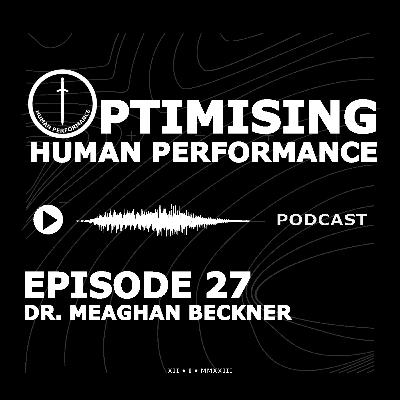



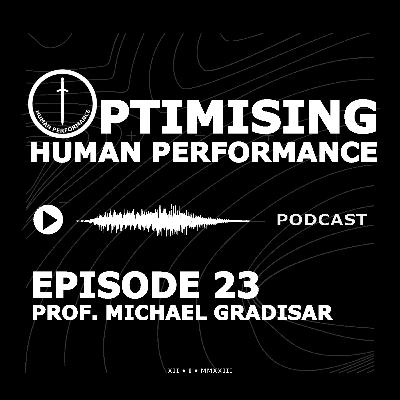
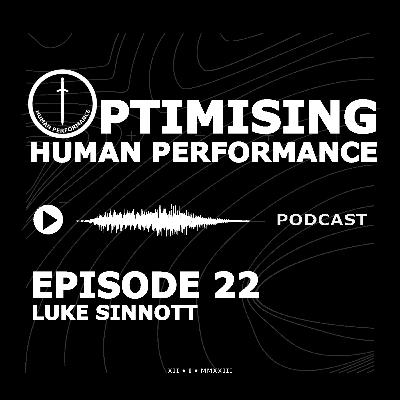

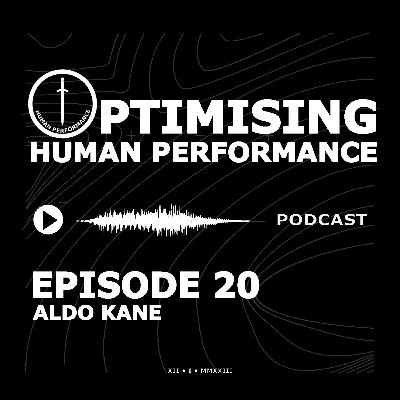
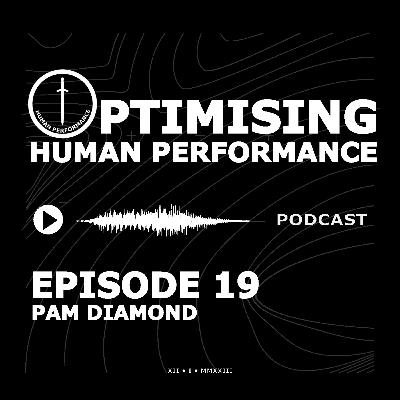
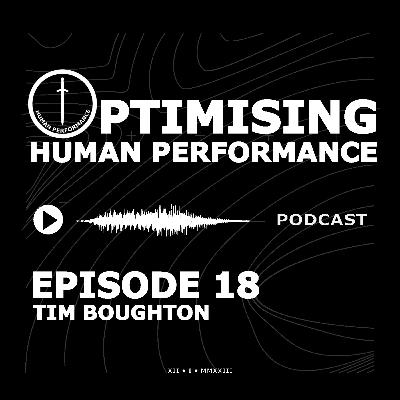

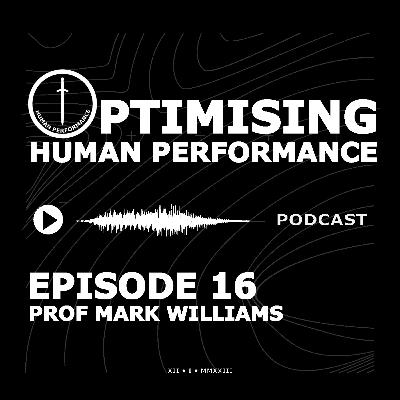


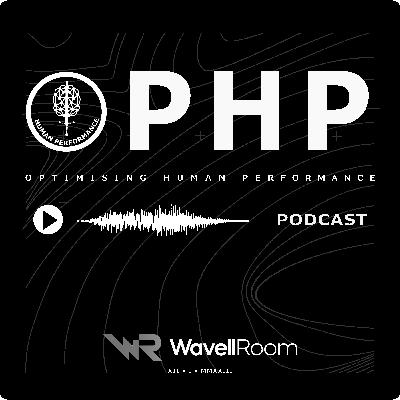
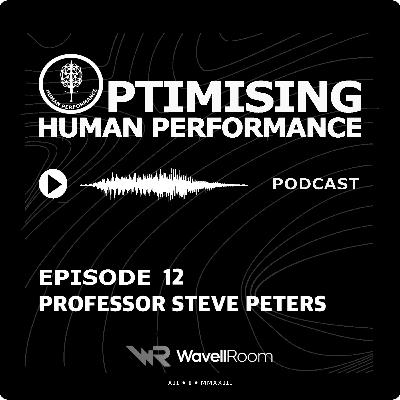
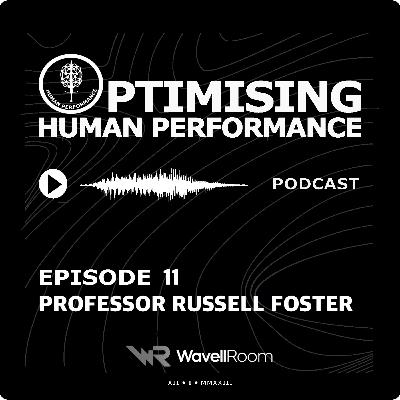
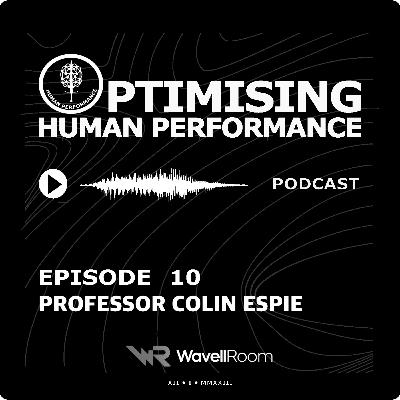
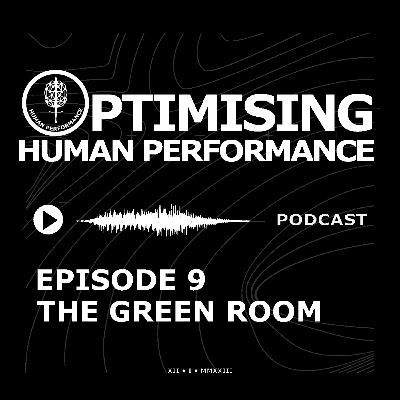




Excellent episode. Really interesting and informative